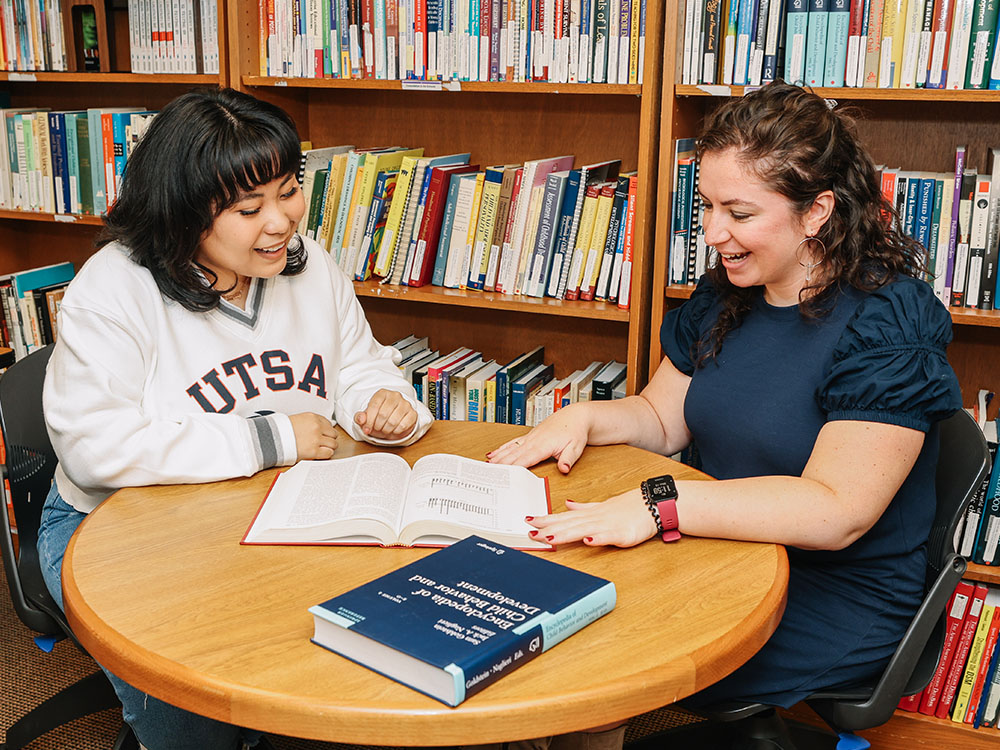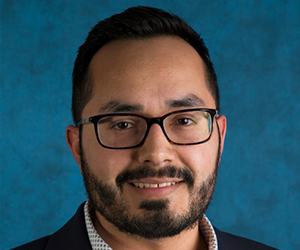
Why Pursue a PhD in School Psychology
The PhD in School Psychology allows students to practice psychology in educational settings, conduct research in the field, pursue faculty positions, and assume leadership roles. Graduate students also complete a full-time internship/school-based practicum where they gain experience providing a range of psychological services, specialized practicum experiences, and a doctoral dissertation based on original research. This program offers three areas of specialization:
- Behavior analysis
- Bilingual school psychology
- Research and evaluation
Doctoral students in School Psychology will attain an understanding of basic content areas in psychology, as well as professional issues including ethical and legal principles, equity, cultural diversity, communication, and quality assurance principles. Students will learn professional competencies in assessment, intervention, consultation, and supervision of psychological services with diverse populations. Students will also demonstrate scientific knowledge and expertise in research methods and data analysis. Doctoral students are welcome to pursue research topics across a variety of areas, such as psychological assessment, mental health intervention, consultation practices, child development and learning, and education and mental health systems issues.
Faculty
School Psychology faculty demonstrate a range in both professional and personal experiences, including psychological practice in multiple settings (e.g., schools, mental health clinics), a variety of research interests, and a variety of content area expertise. School Psychology faculty are well regarded in the field, with publications in top journals across the school psychology, educational psychology, and general and special education fields. School Psychology faculty are also mental health professionals, with licenses and certifications from Texas State Board of Examiners of Psychologists (TSBEP) and National Association of School Psychologists (NASP).
Admission & Application Requirements
Applications are submitted through the UT San Antonio Graduate Application. Please upload all required documents (listed below) on your UT San Antonio Graduate Application. It is the applicant’s responsibility to ensure completion and submission of the application, a nonrefundable application fee, and all required supporting documents are on file with UT San Antonio by the appropriate application deadline.
| School Psychology (PhD) | ||
|---|---|---|
| Admission is only available for the Fall semester | ||
| Required Degree | Bachelor's or Master's Degree from an accredited college or university in the United States or have proof of equivalent training at a foreign institution. Applicants must provide official transcripts indicating a Bachelor’s or Master’s degree in Psychology, Special Education, Curriculum & Instruction, Sociology or a closely related field from a regionally accredited college or university in the United States or show proof of equivalent training at a foreign institution. | |
| Minimum GPA | 3.0 (on a 4.0 scale) Departments may consider GPA of last 60 semester credit hours | |
| Coursework | Completed adequate credit hours or foreign institution equivalent coursework as preparation for the program. | |
| Transcripts* | Required from all institutions attended; international transcripts must be recorded/translated to English | |
| Credential Evaluation | Required if you have earned university-level credit from foreign institutions. Submit an evaluation of your transcripts from FCSA or any NACES-approved credential evaluation agency. | |
| English Language Proficiency | 100 TOEFL iBT / 7 IELTS / Duolingo 120 For exams taken on or after January 21, 2026: We require a minimum TOEFL iBT score of 4.0. |
|
| Purpose Statement | Required Applicants must submit three 400-word statements (total ~1,200 words): (1) describe your fit within the role of a future school psychologist, including anticipated challenges and rewards your foresee in the profession; (2) explain what specific aspects of the UTSA PhD in School Psychology program make it a strong match for you; and (3) outline your 5- and 10-year professional goals (after completing the program) and explain how the PhD program will help you achieve those goals. | |
| Letters of Recommendation | 2 academic or professional reference(s) demonstrating your attributes for successful completion of this program (you will request these through the Graduate Admissions Application; let your recommenders know of your deadline to ensure submissions are on time) | |
| *Unofficial transcripts will be taken into consideration for admissions; however, if admitted into the program, you must submit official transcripts to the University. | ||
Application Deadlines
Applicants are encouraged to have their admission file completed as early as possible. All applications, required documents and letters of recommendation, if applicable, must be submitted by 5:00 PM U.S. Central Time on the day of the deadline. Deadlines are subject to change.
| School Psychology (PhD) | |||
|---|---|---|---|
| Timing on Admission Decision: Applicants can expect to receive an admission decision within 4 to 6 weeks after February 15. | |||
| Application Deadlines for: | Priority | International | Domestic |
| Fall 2026 | December 1 | December 1 | |
| Spring | Not Available | Not Available | |
| Summer | Not Available | Not Available | |
Funding Opportunities
The PhD in School Psychology program offers stipends and assistantships. The purpose of these awards is to enable students to devote their attention to studies for the degree. All students who apply and are accepted into the PhD program will be considered for these awards using the same application that was filed for admission. Students who receive an award may be required to work as either a TA (teaching assistant) or RA (research assistant) at UT San Antonio. Doctoral students who receive support must be registered for 9 semester credit hours during fall and spring and 3 semester credit hours during the summer.
Career Options
Doctoral students will be prepared to practice psychology in educational settings, conduct research in the field, pursue faculty positions, and assume leadership and supervisory roles in School Psychology.
UT San Antonio prepares you for future careers that are in demand. The possible careers below are based on data pulled by a third-party tool called Emsi, which pulls information from sources like the U.S. Bureau of Labor Statistics, U.S. Census Bureau, online job postings, other government databases and more to give you regional and national career outlook related to this academic program.
While in a doctoral program, a student may earn an interim master’s degree provided the following conditions are satisfied:
- A student must be admitted to candidacy.
- A student is eligible to receive a master’s degree upon completion of University-wide requirements and any additional degree requirements specific to the program.
- The Doctoral Studies Committee, Department Chair, and the Graduate Associate Dean of the College must recommend students for the degree.
- The student must apply for graduation by the published deadline the semester prior to awarding the doctoral degree.
- All required coursework in the doctoral program at the time of admission to candidacy must have been taken within the previous six years.
- If the master’s degree requires a thesis, the degree cannot be awarded on the basis of the doctoral qualifying examination.
- Students will not be approved for an additional master’s degree in the same field in which an individual has previously received a master’s degree.
Students who enter the PhD program with a completed master’s degree or with previous graduate coursework will have their transcripts examined to determine how many master’s level courses are required. Additional required coursework will be determined on a case-by-case basis.
Although some courses may be taught in an online or hybrid format, the majority of courses will be delivered in person due to the applied nature of School Psychology competencies and ongoing evaluation of students’ knowledge and skill development.


Student Development Specialist
[email protected]Frequently Asked Questions
What does the admissions committee look for in a PhD applicant?
Faculty in our department review all applicants. In many cases, they are seeking to admit students who share similar research interests. In addition, faculty expect to read strong statements of purpose, including a clear rationale for pursuing the PhD in School Psychology and commitment to the program. Preference will be given to those with a bachelor’s degree or master’s degree in a closely related field. Degrees in other fields may be accepted, subject to the approval of the PhD in School Psychology program faculty. Preference will also be given to applicants demonstrating proficiency in writing, as indicated by scores on the GRE Analytical Writing test and the statement of purpose. Preference will also be given to applicants who are able to clearly articulate their reasons for pursuing the PhD in School Psychology and career plans that depend on this training and experience.
What is the admissions process?
All application materials will be evaluated by faculty in the PhD in School Psychology program. Selected applicants will complete an interview with the program faculty. Following the interviews and review of all application materials, faculty will determine which students to admit for the academic year. All applicants are notified of admission or denial through The Graduate School. It is the intention of the Doctoral Program Committee to make admissions and stipend offers by April 15.
Where can I learn more about submitting documents?
For detailed instructions on submitting documents, please visit Graduate Admissions.
What are the minimum GRE scores required for admission?
We consider all applicants holistically, carefully examining all application materials. A student’s GRE score is interpreted in light of these other materials, but the program does require a minimum score of 3.5 on the Analytical Writing portion of the GRE.
Can I receive credit for similar coursework that I have already completed as part of an MA program?
Applicants with a master’s degree in the field of the doctoral program of interest or related field may apply for a maximum of 30 semester credit hours of previously earned graduate credit, pending approval from the Graduate Program Committee, Academic College, and Dean of the Graduate School—provided the credit has not been used toward another doctoral degree. There is no guarantee that students will be able to apply previously earned graduate credit to the PhD in School Psychology program.
How long does it take to complete the Ph.D. program?
Students completing the program by following the recommended course sequence can complete the program in 5 years.
How many credits do students typically take each semester?
In the first four years of study, students are expected to take 12 hours per semester (or four classes) during Fall and Spring. Students are expected to take up to 6 hours (or two classes) during the Summer semester. During the fifth year of study, students will be completing a full-time internship experience and may only be taking the internship course.
Can I complete the program while also working full-time?
Due to the length of the program, number of hours required, dissertation requirements, practicum requirements and internship requirements, it would be difficult to complete the program while working full-time.
What license(s) can I obtain after completing the program?
In Texas, students who complete the Ph.D. in School Psychology program are eligible to be Licensed Psychologists, Licensed Psychological Associates, and Licensed Specialists in School Psychology through the Texas State Board of Examiners of Psychologists (TSBEP). However, completing the program does not guarantee licensure. Students must complete TSBEP applications for licensure.
Is the Ph.D. in School Psychology program accredited by the American Psychological Association (APA)?
No, the Ph.D. program is not currently accredited by the APA. The Ph.D. program was designed with APA accreditation standards in mind, and an intent to apply for accreditation in the future. However, APA accreditation requires student outcome data, which is not currently available given the recent establishment date of the Ph.D. program. We plan on seeking APA accreditation when appropriate.
